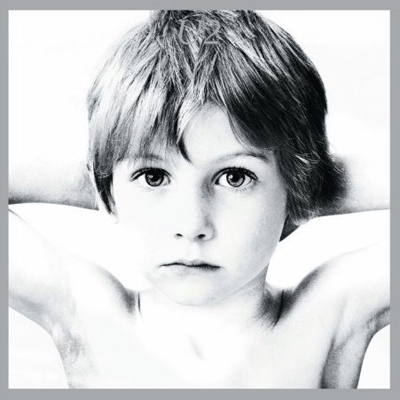
Boy, October and War Deluxe Editions
Island
As much as I’ve tried in reviewing the deluxe, remastered reissues of U2’s first three full-length releases, it’s hard to get a clear amount of objectivity. For no matter how much effort I exert to listen to them as simply recorded objects, it’s impossible to unlock these albums’ inexorable impact on my own personal history. Boy, October, War—I know these records better than I know myself. Though I first encountered U2 through The Unforgettable Fire (at the tender age of 13), I soon worked my way through the band’s back catalog (not to mention through any band with a passing resemblance: Simple Minds, the Alarm, Big Country, etc.) to these albums. It was the first time I ever really gave a shit about music, and even more than that 1984 opus, these records were the soundtrack for me and my small band of droogs. All it would take was a chill in the air and someone commenting that “it’s cold outside” before someone else would chime in with “it gets so hot in here.” U2 was the be-all and end-all for us, a beacon of political ideology in the cold-war era, a band of brothers with exotic names like Bono and the Edge, a worldly but humble troupe whose Dublin seemed on the other side of the world but yet still not so distant from ours in Ohio.
But perhaps there was no better band for which a boy to come of age with than U2, and specifically the U2 on these three records. This was long before Bono Vox put on those bug-eyed sunglasses and became BONO, rock savior unto the world. When he made these records, he was full of wide-eyed optimism, a young man bent on changing the world with a song not through domineering. I came to these records an innocent, untainted by the realities of the world. It’s no accident that I connected with the aptly named Boy. I mean, I too “thought that we had the answers” even though “it was the questions we got wrong.” As Paul Morley eloquently states in the reissue’s liner notes, “Boy is about being boys, about leaving behind what makes you feel safe, about facing up to dark uncertainty,” and that certainly sounds like my pubescent years of questioning everything that was around me. Sonically, Boy is the sound of a band in full possession of their potential, bursting through the very limits of their musical capabilities. Add in the bonus disk’s inclusion of the Martin Hannett–produced “11 O’Clock Tick Tock” single and there isn’t a better introduction to U2’s own introduction to the world.
By the time U2 recorded October, they were a bit more world-weary and, lyrically speaking, literally out of ideas as Bono’s notebook had been stolen. But there is a certain earthiness to the record—reflected in the album art’s brown palette and the dockside photos of the band—even as they take to the heavens with songs like leadoff track “Gloria.” As on “Shadows and Tall Trees” (the name of a chapter in Lord of the Flies) from Boy, Bono plays with literary tropes, here naming a song after Robert Heinlein’s Stranger in a Strange Land, itself a biblical reference from Exodus. His idealism is translated into archetypes, whether religious or everyman, while musically the Edge, Adam Clayton and Larry Mullen, Jr. veer from the black-and-white starkness of their debut into those warmer hues. View it as a transitional record or the difficult second album, it really is something much simpler than that: U2 exploring the bigger questions with which we’ve all grappled.
If Boy was about innocence, then War is the result when the blindfold of youth is removed (a theme seen in the use of the same once adolescent cover star from Boy, now as a piercing eyed teenager.) It is here that the band had something to say, and though to older ears it may have come off too idealistic or preachy, for a teen unaware of Belfast, the Falklands and the many faults of Reagan imperialism and Thatcherism, it had a lasting effect. “Sunday Bloody Sunday” was a gripping call not-to-arms and, even though less politicized, “New Year’s Day” haunting melody and longing lyricism simultaneously expressed a worldwide melancholy and optimism. Here U2 is at their most strident, fully confident in both what they were about to accomplish sonically and as a voice of dissidence.
Island’s new treatment of these three albums is appropriately impressive, with each packaged as a CD-sized hardcover book inside a slipcase. It’s really pointless to quibble too much about the material on each set’s bonus disk; each simply includes the extra material of the time (single B-sides, live recordings, unreleased out-takes). The handsome presentation and impressively improved remastering (overseen by the Edge) are all that’s needed to recommend them, even without the childhood memories attached.Stephen Slaybaugh
PAST PERFECTS
